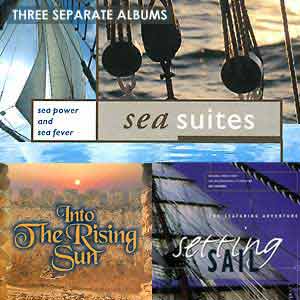Setting Sail / Sea Suites / Into The Rising Sun
Music composed and arranged by Guy Cuyvers
Performances:
Sea Suites – Flemish Radio Orchestra conducted by Silveer Van den Broeck.
Setting Sail: The Seafaring Adventure – Flemish Radio Orchestra conducted by Michel Tilkin.
Into the Setting Sun: Vasco de Gama & the Search for the Sea Route to the East – BRTN Symphony & Choir, conducted by Hans Rotman (and Carl Van Eyndhoven, choir)
Vocals by Sandra Van Beirs.
Guitar performed by the composer.
Running Time: 49:55

See also:
www.guycuyvers.com These three CDs present music by the composer Guy Cuyvers for several nautically themed documentaries, and as such perhaps the closest comparison on disc might be the various documentary scores issued by John Scott from his work on the underwater films of Jacques Cousteau. All the films are the work of Mare Nostrum Productions, a US / Belgium based company which specialises in ocean films and the tone is overall one of intense romanticism which will beguile many listeners.
The first album offers suites from two films, Sea Power and Sea Fever. Sea Power was the first film score by the Belgian composer Guy Cuyvers, the film itself being commissioned by the Mariners’ Museum in Newport News, Virginia. The five part suite is deeply lyrical in the finest tradition of sea music, with a grand, stirring theme and several eloquent variations which evoke the spiritual, poetic nature of Man’s relationship with the Ocean. This is rousing stuff which could easily have come from some grand Hollywood epic, even making an eloquent footnote to Film Score Monthly’s massive 3CD issue of Bronislau Kaper’s Mutiny on the Bounty, which I also review this month.
In contrast Sea Fever takes its title from the famous poem by John Masefield…
I must go down to the sea again, to the lonely sea and sky
And all I ask is a tall ship and a star to steer her by…And explores two types of sea fever, the longing for the sea, and a literal illness… lyrical music with (in places) a yearning quality absent from the first suite, the two suites perfectly compliment each other and result in a most enjoyable album, against which the only fault one might find is the rather brief running time.
Anyone who has, for instance, enjoyed George Fenton’s score for Blue Planet / Deep Blue will be in their element here, while the touching main theme from Sea Fever, which comes to fruition in the closing cue, ‘Harmony’, has just a hint of Christopher Gordon’s marvellous On The Beach (a score actually written after Cuyver’s work).
Setting Sail brings us an hour of music from a four part series documenting the achievements of non-Western mariners, Polynesian, Arab, Indian and Chinese. ‘The Great Voyagers’ theme is striking and eloquent, occupying a similar musical language to Stephen Warbeck’s Shakespeare in Love. Indeed, the following ‘Wendazako’ likewise has a courtly, majestic nobility recalling the time of the Bard. ‘Arabian Sunrise’ has a calm tranquillity while ‘Scent of Time’ has a lovely, lyrical quality which in other circumstances could have resulted in a fine cinema love theme. So this often times gentle and reflective score goes, from a string quartet version of the series theme to the touching melancholy of ‘Forgotten Harbors’ and ‘Vanished Glory’. Tender of often elegiac, despite the subject matter the music is almost entirely in melodic modern Western idiom with a neo-classical gracefulness which makes for a very appealing album.
Into the Setting Sun is the score to the story of “Vasco de Gama & the Search for the Sea Route to the East”, tracing a route from Portugal through Europe, around Africa to India and the Far East. The score opens with an uplifting choral theme over a propulsive snare rhythm leading into a score which demonstrates the same range of cultural diversity as the story it accompanies. For instance ‘Lisbon Sunrise’ is a charming song with the singer Sandra Van Biers accompanied by the composer on guitar. The melody may recall Francois Lai but the treatment is fresh and new. ‘First Step’ find the composer offering an appealing variation on the main theme in typical Spanish style, while the Guinea Theme offers marimba, other percussion and chorus in a playful twist on the main melody. ‘Towards the Cape of Storms’ has a lyrical majesty which will again appeal to fans of George Fenton’s Blue Planet, or equally Adrian Johnson’s Shackleton. Simply visit ‘The Castle’ or experience ‘Faded Glory’ to fall under this music’s enchantment.
And so unfolds a very beautiful disc which captures the romanticism and sense of wonder of the Golden Age of maritime exploration. That this time is now long past is reflected in a feeling of longing and loss which pervades many of the cues, the result being a score which will delight fans of Morricone at his most bittersweet.
All three albums are well worth adding to any collection, but if I had to recommend a place to start I would chose Into the Setting Sun simply because it offers the greatest variety of material. Nevertheless I doubt any lover of orchestral sea music will be disappointed by any of the three discs.
Gary Dalkin
Return to Index